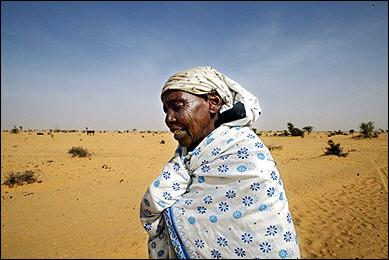Horse-riding Sudan militia terrorise women, children

By Matthew Green
TINE, Chad/Sudan border, Jan 27 (Reuters) – Saida Ibrahim heard the thunder of stallions charging across the plain towards her village and ran for her life.
“I was fetching water at the well when I heard the sound of gunshots and horses’ hooves,” said the 23-year-old after days of trekking with her barefoot daughter Selma strapped to her back.
“I ran away into the bush,” she said, huddling in a green shawl. “We slept under the stars with no food and no cover. We only had a little flour which we mixed with water to drink.”
Deprived of anything to eat, three-year-old Selma clutched a handful of sand in her tiny fist as she sat by her mother.
Like dozens of other Sudanese women and children refugees who trekked into Chad on Tuesday, Ibrahim, who is eight months pregnant, was fleeing an attack by “Janjaweed”, an Arab militia group allied with Khartoum that has been spreading terror in western Sudan with a sharply escalating series of raids.
Amnesty International says there is strong evidence that the government is arming the militia as a proxy force to target black African farming communities in western Sudan, aiming to crush an uprising that began early last year.
A victim of a humanitarian crisis that has caused scarcely a ripple of interest in the outside world, Ibrahim and tens of thousands of others have arrived in Chad since December with nothing but a few goat skins, pots and handfuls of wheat.
Most are women and children, leaving the men to join rebels fighting the government or to tend herds of goats, camels and cattle roaming Sudan’s western Darfur region.
“We don’t know what to do, but at least here we’re safe,” said Ibrahim’s mother, Khada Malla, 50, as a gaggle of children milled around listlessly, wondering what would happen next. “We’ll ask God to send us something to eat,” she said.
Minutes earlier, a Sudanese government Antonov plane had circled high overhead on a bombing run. The drone of its engines were a reminder of the frequent bombardment of Sudanese villages that has maimed and killed many civilians.
Aid workers say the number of refugees pouring across the frontier and the number of air raids has risen sharply in recent weeks, pointing to an intensified campaign by government forces.
Rebels drawn from the African tribes, including the large Zaghawa group which overlaps the Chad-Sudan border, accuse the government of discriminating against the arid region.
Refugees sheltering from the incessant wind with sheets hung from sticks described a familiar pattern of attack by the militia, who storm into villages at dawn on horses, camels and in vehicles to shoot, burn and pillage.
“They surrounded our village and charged in all at once,” said Mariam Hamid Saleh, 30. “They burnt our houses,” she said, giving a shriek to replicate the Janjaweed war cry.
The area’s remoteness has contributed to the scantiness of media coverage of the disaster in western Sudan, while aid agencies have only set up limited operations to help 100,000 Sudanese refugees who have fled to Chad since March.
“About two hundred people ran away, they are on their way too,” said an old man named Ibrahim Abdallah, arriving with his donkey from the village of Aed Al-Kher, 70 km (45 miles) across the frontier. “All the villages are empty he said,” glancing across to Sudan. “Over there, it’s war.”
